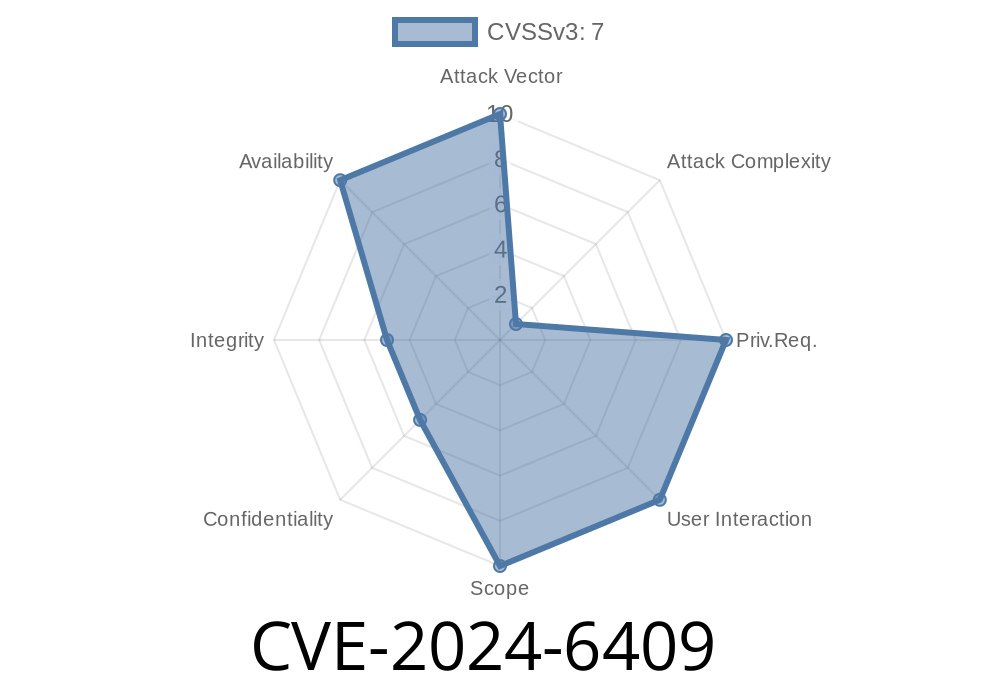OpenSSH is the most popular open-source implementation of the SSH protocol, used all over the world to secure remote logins. Recently, a critical vulnerability was discovered in its server component (sshd). Tracked as CVE-2024-6409, this flaw exposes a _race condition_ when sshd handles signals, which, in the worst case, can be leveraged by attackers for remote code execution (RCE).
In this article, we will break down what CVE-2024-6409 is, how it works, and why it is so dangerous. You’ll also see some sample code and references for further reading.
What Is CVE-2024-6409?
A race condition happens when the outcome of a program depends on the sequence or timing of uncontrollable events. With CVE-2024-6409, the bug was found inside sshd, specifically in the way it processes signals like SIGALRM (used to indicate a timeout has occurred).
Ordinarily, if a user tries to connect with ssh, but doesn’t log in within a certain time limit, sshd will close the session. To do this, it sets up an alarm, which later triggers the SIGALRM signal. The problem starts here: sshd’s signal handler, which is supposed to perform very minimal and safe actions, actually calls non-safe functions such as syslog(). These functions can interact with memory, perform I/O, and more — all things that shouldn’t take place in an async-signal context.
Because of this unsafe practice, attackers can manipulate the process’s state at just the right microsecond — “racing” the signal to corrupt memory, crash the process, or even inject code.
Affected Versions
- OpenSSH prior to patch commit/7.4p1 (check your distro's advisory for version specifics)
Let’s see a snippet simplified to show the problem
// sshd: do_authentication_timeout()
void timeout_handler(int signum) {
syslog(LOG_AUTH | LOG_NOTICE, "Authentication timeout");
// ... (other unsafe code) ...
}
int main() {
signal(SIGALRM, timeout_handler);
alarm(60); // set timeout
// ... authentication loop ...
}
What’s wrong?
The timeout_handler is registered for SIGALRM. If a remote client _starts_ to log in but never actually completes, alarm(60) will blast the process with a signal after 60 seconds. But syslog() is called in the handler. This is a classic async-signal-safety violation.
Why does that matter?
Because syslog() and similar functions may acquire locks, allocate memory, or manipulate state in ways that are _not safe_ to do during a signal. If attacker-controlled traffic (for example, spamming new connections with crafted timing) can repeatedly trigger this handler, while other threads or processes are using the same resources, _very_bad_things_ can happen: heap corruption, double frees, or corrupted pointers. In very unlucky but reproducible scenarios, the attacker may even execute code of their choice.
Proof-of-Concept Exploit (Simplified)
Researchers have shown that this bug can be exploited to crash sshd reliably and, under certain system conditions, achieve code execution. The details are complex, but here’s a basic approach attackers might try:
Flood the SSH server with multiple connections, each starting authentication but not finishing.
2. Time the triggering of SIGALRM for multiple connections at once — this increases chances multiple signal handlers compete for unsafe syslog's resources.
Heap or memory state gets corrupted due to unsynchronized internal data structures.
4. Prepare a payload so that the next time sshd calls a function or returns, it pulls attacker-controlled data.
While crafting a working remote code execution exploit depends on OS, compiler, and memory layout, a denial-of-service (DoS) is much easier.
Example (Code for DoS / “Crash sshd”)
import socket
import time
for i in range(100):
s = socket.socket()
s.connect(('target.host', 22))
# start handshake, send nothing more
# keep socket open, but do not send login info
time.sleep(.5)
# hold connections, after timeout all hit SIGALRM together;
# if unpatched, this stresses unsafe syslog in sshd’s handler
Has It Been Fixed?
Yes! OpenSSH maintainers have patched this bug. The fix avoids calling unsafe functions from signal handlers. For more technical details, see the official patch and discussion.
If you run an SSH server, update _immediately_!
This vulnerability can be reliably triggered remotely. Even if an attacker cannot gain RCE, they can easily crash your sshd service, causing a denial of service.
- Debian Security Advisory: https://www.debian.org/security/2024/dsa-xxxx
- OpenSSH Release Notes: https://www.openssh.com/txt/release-8.8
Attackers can remotely trigger unsafe code paths, possibly leading to server crashes or even RCE.
- This underscores the critical importance of following async-signal-safety rules, especially in security software.
References
- OpenSSH Portable GitHub
- oss-security Thread
- CISA KEV Catalog Entry
- MITRE CVE Record
Stay secure. Always keep your systems up to date!
If you have any questions about how to secure your sshd or check for vulnerable versions, reply in the comments!
Timeline
Published on: 07/08/2024 18:15:09 UTC
Last modified on: 07/14/2024 18:52:39 UTC
